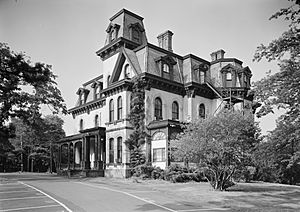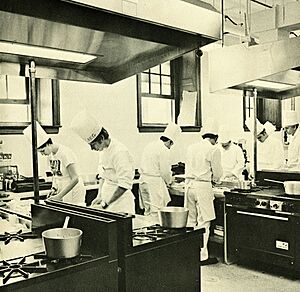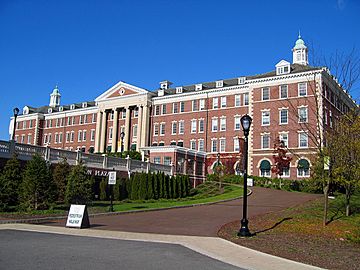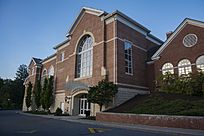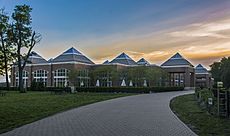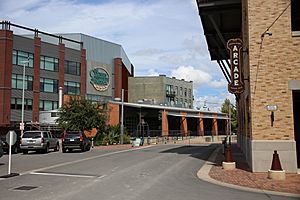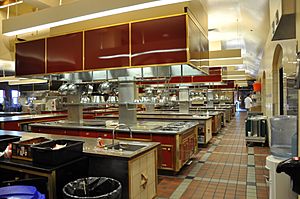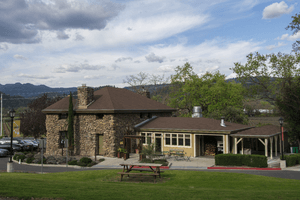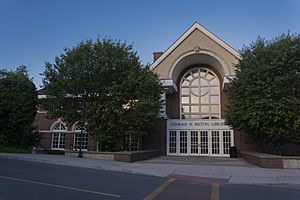The Culinary Institute of America facts for kids
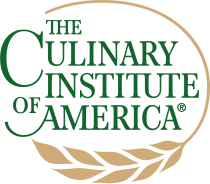 |
|
|
Former name
|
New Haven Restaurant Institute (1946–1947) Restaurant Institute of Connecticut (1947–1951) |
|---|---|
| Type | Private culinary school |
| Established | May 22, 1946 |
| Founders | Frances Roth, Katharine Angell |
| Accreditation | MSCHE |
| Endowment | $138.3 million (2019) |
| Chairman | John C. Metz Jr. |
| Chancellor | L. Timothy Ryan |
| President | Michiel Bakker |
| Provost | Mark Erickson |
|
Academic staff
|
197 |
| Undergraduates | 3,005 (fall 2022) |
| Postgraduates | 119 (fall 2022) |
| Location |
,
New York
,
United States
41°44′45″N 73°56′0″W / 41.74583°N 73.93333°W |
| Colors | Sage Green and Fire Gold |
| Nickname | Steels |
|
Sporting affiliations
|
HVIAC |
| Mascot | Sting |
The Culinary Institute of America (CIA) is a special private university. It teaches people how to become amazing chefs and food experts. Its main campus is in Hyde Park, New York. There are also other campuses in California (St. Helena and Napa), Texas (San Antonio), and Singapore.
The CIA was the first school in the United States to teach culinary arts. It offers different types of degrees, from associate to master's degrees. Many of the teachers are Certified Master Chefs. The school also helps professionals learn more and offers fun cooking classes for anyone who loves food. Students even get to run their own restaurants on the U.S. campuses!
The school started in 1946 in New Haven, Connecticut. It was a training school for soldiers returning from World War II. As more students joined, the school bought a bigger place in Hyde Park, New York, in 1970. This is now its main campus. The CIA started giving out associate degrees in 1971 and bachelor's degrees in 1993. Master's degrees became available in 2018. New campuses opened in St. Helena (1995), Texas (2008), Singapore (2010), and Napa (2016).
Contents
History of the CIA
The New Haven Restaurant Institute was founded on May 22, 1946. It was started by Frances Roth and Katharine Angell in New Haven, Connecticut. This school was created to train veterans coming back from World War II. It was the very first culinary college in the United States.
With help from Yale University, the school bought the Davies mansion in New Haven. The first class had sixteen students. Teachers included a dietitian, a baker, and a chef. In 1947, the school changed its name to the Restaurant Institute of Connecticut. This showed how much it was growing. In 1951, it changed its name again to The Culinary Institute of America.
By 1969, about 1,000 students were enrolled. The original campus was too small. So, in 1970, the school bought a former Jesuit building in Hyde Park, New York. In 1971, the college started offering associate degrees. The Hyde Park campus opened its doors in 1972.
From 1974 to 1979, the school built new student dorms, a library for cooking books, and a career center. From 1982 to 1984, new restaurants opened, like the American Bounty and Caterina de' Medici Restaurants. In 1984, a center for continuing education opened. The school also improved its teaching kitchens. In 1990, a baking and pastry facility opened. It was later named the Shunsuke Takaki School of Baking and Pastry.
In 1993, the school opened its Conrad N. Hilton Library. It also started offering bachelor's degree programs. In 1995, the first branch campus opened. This was the Culinary Institute of America at Greystone in St. Helena, California. In 1998, a Student Recreation Center was built.
The Apple Pie Bakery Café opened in 2000. The Colavita Center opened the next year. More student dorms were built in Hyde Park in 2004. In 2005, Anton Plaza opened in Hyde Park. The Ventura Center for Menu Research and Development opened in St. Helena. In 2008, some teachers had concerns about the school's president, Tim Ryan. They discussed issues like older technology and class quality. Ryan later met with teachers and made improvements to schedules and classes.
The school's third campus opened in 2008 in San Antonio, Texas. Two years later, the CIA opened a campus in Singapore. It was located at Temasek Polytechnic. In 2012, the CIA started a bachelor's degree in culinary science. In 2014, it added a bachelor's degree in applied food studies. That same year, the college bought part of Copia. This was a former museum in downtown Napa, California.
In 2016, the college opened a campus there, the Culinary Institute of America at Copia. This campus is home to the CIA's new Food Business School. The college needed more space than its St. Helena campus offered. In 2017, the CIA started offering classes in food photography and food styling. This was because food photos became very popular online. It also launched new business and hospitality degrees. In 2020, an online business leadership program was announced.
The college started offering master's degrees in 2018. These included Food Business and Wine and Beverage Management. In 2023, it added an online Sustainable Food Systems master's program. It also started master's degrees in Culinary Arts. This culinary arts master's program is at the Hyde Park campus. It includes business classes and hands-on training at famous restaurants. In 2024, the CIA partnered with Kapiʻolani Community College. They created a program to train people for jobs in the University of Hawaiʻi system. In January 2025, a new Culinary Therapeutics master's program was announced. This program uses cooking to help people with their health and well-being.
CIA Campuses
Hyde Park, New York Campus
The Hyde Park campus is the biggest. It has four restaurants where students can practice their skills.
- The American Bounty Restaurant serves food from the Hudson Valley.
- The Bocuse Restaurant offers traditional French food with modern twists. It was first called the Epicurean Room and Rabalais Grill in 1973. It was later renamed to honor Paul Bocuse in 2012.
- The Ristorante Caterina de' Medici focuses on Italian food.
- The Apple Pie Bakery Café has a relaxed feel.
The school also opens temporary restaurants on campus. One example is the Post Road Brew House. This gastropub opened in 2016.
Students can join sports teams and clubs. The school's sports program started in 2004. It is part of the Hudson Valley Intercollegiate Athletic Conference.
Napa County, California Campuses
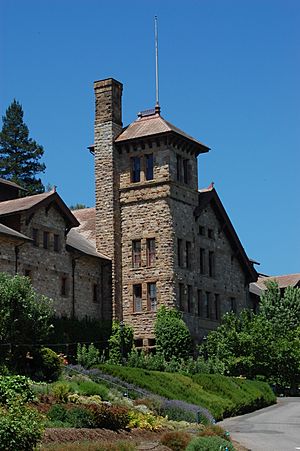
The CIA has two campuses in Napa County, California.
- The campus in St. Helena is called the Culinary Institute of America at Greystone. It offers associate degrees, special certificates, and classes for professionals.
- The campus in Napa is called the Culinary Institute of America at Copia.
The Greystone campus also has two restaurants. The Gatehouse Restaurant serves modern dishes using local ingredients. The Bakery Café by illy serves food made by students studying baking and pastry arts.
The Copia campus was bought in 2015. It used to be Copia, a museum in downtown Napa. The campus opened in 2016. It is home to the CIA's new Food Business School. It also has a restaurant called the Restaurant at CIA Copia.
San Antonio, Texas Campus
The San Antonio campus is in Downtown San Antonio's Pearl Brewery. It offers associate degrees in culinary arts and baking and pastry arts. It also has programs for food lovers and professionals. The campus restaurant, Savor, serves dishes inspired by foods from all over the world. The campus also hosts special events for food service professionals.
Singapore Campus
The Culinary Institute of America works with the Singapore Institute of Technology and Temasek Polytechnic. They offer a bachelor's degree program in Culinary Arts Management in Singapore. This program is for students who have already earned diplomas in hospitality, tourism, or culinary arts. Temasek Polytechnic and the CIA built a large educational facility with three teaching kitchens for these programs.
How the CIA is Run
The Culinary Institute of America is a non-profit organization. It is managed by a group of 24 people called the board of trustees. These trustees help make big decisions for the college. This includes things like tuition fees and new building projects.
The current president of the school is Michiel Bakker. The president works with a team of vice presidents and other leaders. The school has different departments to help with classes and restaurants.
The official school colors are green and gold. These colors were chosen because they are common food colors. The school's logo includes a stalk of wheat.
Teachers at the CIA
As of Fall 2022, the school had 130 full-time teachers and 67 part-time teachers.
What Students Learn
In 2013, some students expressed concerns about educational standards. The school worked to address these issues.
Degree Programs
The college offers many associate, bachelor's, and master's degree programs. For each associate and bachelor's program, students must complete a 15-week externship. This is like an internship at a CIA-approved food service business. The school's degree programs are officially recognized by the Middle States Commission on Higher Education.
The Food Business School
In spring 2015, the institute opened the Food Business School. This school is for adults who want to learn about the business side of food. Its teachers come from top universities and the food industry. The school offers online classes and short programs. It also has longer programs that last several months. This program gives out certificates, but not graduate degrees.
Other Programs and Classes
The New York campus also offers classes for people who want to keep learning. The California and Texas campuses have classes for wine experts and food lovers. The college also worked with Epicurious to create an online cooking school. The CIA also has a special program called ProChef. This program recognizes cooking skills and business knowledge.
The CIA's California campus has a fast-paced cooking program. It is for students who already have a bachelor's degree in hospitality.
Libraries and Museums
The school's main library is the Conrad N. Hilton Library in Hyde Park. It has a special collection of old and rare items. This includes an ancient Roman amphora (a type of jar). It also has old menu covers from famous restaurants.
The Greystone campus has the Margie Schubert Library. It is right next to the school's teaching kitchens.
The CIA also has a college museum. It is called the Chuck Williams Culinary Arts Museum. It is located at the Copia campus in Napa.
Student Life
How to Get In
Getting into the Culinary Institute of America is not super difficult. In fall 2022, the school received 1,887 applications. About 95 percent of those students were accepted. The CIA tries to admit students based on their skills, not just how much money they have.
Student Numbers
In Fall 2022, the university had 3,005 undergraduate students. About 415 of these students had transferred from other schools. There were also 119 graduate students. Most students (95 percent) were enrolled full-time. About 18 percent of students were from New York. About 12 percent were international students. Most students (about 82 percent) were 24 years old or younger. The average high school grade was a B (3.0 GPA). About 68 percent of undergraduate students lived on campus.
In 2014, undergraduate students studied in five different schools:
- School of Culinary Arts
- School of Baking and Pastry Arts
- School of Business and Management
- School of Liberal Arts and Food Studies
- School of Culinary Science and Nutrition
Most bachelor's degree students (83%) studied business management.
CIA Brand and Events
The CIA has a special program that sells products with its name on them. These include items for restaurants and homes. It also publishes cookbooks for both professional chefs and home cooks. One of its main cookbooks, The Professional Chef, even has an interactive iPad version. In the late 1990s, the CIA had its own TV show called Cooking Secrets of the CIA.
Special Events
Since 2007, the school has hosted the CIA Leadership Awards every April. This event honors people who have done great things in the food industry. These events also raise money for student scholarships. At the Leadership Awards, the school gives out the Augie Award. This award is named after Auguste Escoffier, a famous French chef. In 2017, Shep Gordon, Jacques Pépin, and Martha Stewart all received this award.
In 2017, the CIA also started its Thomas Keller Golf Classic. This is a golf event and fundraiser for student scholarships. The first event was held in June at Silverado Resort and the school's Copia campus in Napa County.
Famous People from the CIA
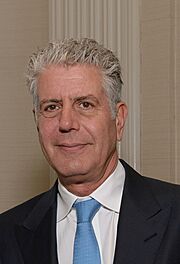
The CIA has about 50,000 graduates who work in the food industry. Here are some of the well-known alumni:
- Grant Achatz
- John Besh
- Richard Blais
- Jérôme Bocuse
- Anthony Bourdain
- David Burke
- Anne Burrell
- Maneet Chauhan
- Kelsey Barnard Clark
- Michael Chiarello
- Roy Choi
- Mike Colameco
- Scott Conant
- Cat Cora
- Dan Coudreaut
- Rocco DiSpirito
- John Doherty
- Steve Ells
- Todd English
- Dean Fearing
- Susan Feniger
- Larry Forgione
- Amanda Freitag
- Duff Goldman
- Johnny Iuzzini
- Vikas Khanna
- Spike Mendelsohn
- Michael Mina
- Rick Moonen
- Sara Moulton
- Rajat Parr
- Charlie Palmer
- L. Timothy Ryan
- Walter Scheib
- Barton Seaver
- Michael Smith
- Kerry Simon
- Michael Symon
- Roy Yamaguchi
- Geoffrey Zakarian
See also
 In Spanish: The Culinary Institute of America para niños
In Spanish: The Culinary Institute of America para niños
 | James Van Der Zee |
 | Alma Thomas |
 | Ellis Wilson |
 | Margaret Taylor-Burroughs |


